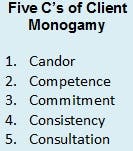I was recently reading Winner Takes All: Steve Wynn, Kirk Kerkorian, Gary Loveman and the Race to Own Las Vegas by Christina Binkley. A quote in the book sparked this article: Gary Loveman, the president and CEO of Caesars Entertainment Corporation (formerly Harrah’s Entertainment), said, “I’m in the business of fostering customer monogamy.”
Loveman, a former Harvard Business School professor before joining Harrah’s Entertainment, noted that Harrah’s biggest weakness was “lack of customer loyalty.” Loveman and his team were instrumental in creating the company’s Total Rewards® Program that was modeled on credit card loyalty programs, which became a major impetus in developing “customer monogamy” for the company’s properties across the United States.
It occurred to me that this idea applies to client retention. I thought hard about the manner in which I’ve been successful at keeping my best clients happy and earning repeat business – and fees. That lead to my Five C’s of Client Monogamy.
Candor
I truly believe this is the most important factor in fostering client monogamy. Trust is the cement that bonds a recruiter to his or her client. It often takes numerous years to build a professional relationship based on trust; however, it only takes seconds to tear it down from a lack of trust.
I recently had an instance with a good client of mine where candor paid off for me. My client gave me a job order in a geographic market I was unfamiliar with. I wanted to penetrate this market due to the plethora of potential clients and candidates. Unfortunately, I wasn’t able to fill their search.
I pride myself on filling my clients’ “tough to fill searches.” As much as I hate to admit defeat, I had to tell my client in an honest and timely manner I did not have any viable candidates for their search. I thought my client would never use me again; however, she told me how much she respected my candor and how infrequently she receives it from other search firms. I’ve subsequently gotten more job orders from my client and have made more placements with them, too.
Competence
Our clients hire and retain us as their trusted search firm because we’re experts in our respective recruiting niche. We need to show our clients repeatedly that we are value added to them and their organization. Having been a former corporate recruiter, there was nothing more aggravating than when a search firm said it could fill all of my searches. I wanted to know the search firms with proven expertise in a specific function and/or industry. I wanted to know who was truly competent.
Expertise is a differentiator we as recruiting professionals can sell on because it’s based on fact and not fiction. Clients become monogamous with us based on our demonstrated competence.
Commitment
All successful long-term relationships are based on a mutual commitment. Our clients want to know we’re there for them not only in the best times, but more importantly, when the times get tough. I have a client for whom I have made numerous placements over the last five years. Currently, they are experiencing tremendous uncertainty, are on a hiring freeze, and there is the potential for significant layoffs. Instead of turning my back on them because they’re not paying fees right now, I’m spending time making sure these clients are okay. I’ve also offered many of them the opportunity for career coaching in the event they are laid off. I know this will pay dividends for me regardless if they remain with the company or not.
Consistency
We’ve all heard the expression, “You are only as good as your last search.” For me, consistency is the most important constant I’ve learned that needs to be exercised in order to be successful long-term in the recruiting business. We need to consistently plan each day and week. We need to consistently make marketing calls each week. And, we need to consistently deliver quality candidates in an expedient manner every time our client calls with a new job order.
Consultation
Our clients remain monogamous to us because of our expert-level competence. However, in order to provide the next level of superior customer service, we have to be seen as their trusted consultative expert. Our best clients will confide in us when they need to be coached through a delicate situation. Because we’ve fostered our client relationship for numerous years we are able to counsel them through numerous business or talent acquisition-related issues. Also, they rely on us to be ingrained and dug in deep within our functional and/or industry niche. We need to be able to consult them on many big picture issues that affect the way they seek, attract, and retain talent in their organization.
Here’s a quiz: What’s the most recent civilian unemployment rate for professionals age 25 years and older with a Bachelor’s Degree or better, according to the Bureau of Labor Statistics (see answer below)? We should all be able to quickly educate our clients when they ask us where all the candidates are “with all those unemployed people out there.”
This theme of fostering client monogamy made me want to share a quote from the legendary UCLA basketball coach, John Wooden. Coach Wooden said, “Whatever gifts the Good Lord may have blessed us with, we are the ones who must get down on our hands and knees and do the work. It’s up to us to make the garden beautiful.” Our clients are our “garden” and it’s our responsibility to keep the weeds out and make the flowers bloom. How much time are you spending in your “client garden” fostering its sustenance, growth, and longevity?
Quiz answer: For January 2013 it was 3.7%; that’s more than full employment according to the management consulting firm, McKinsey & Company. They say full employment is 5%.
